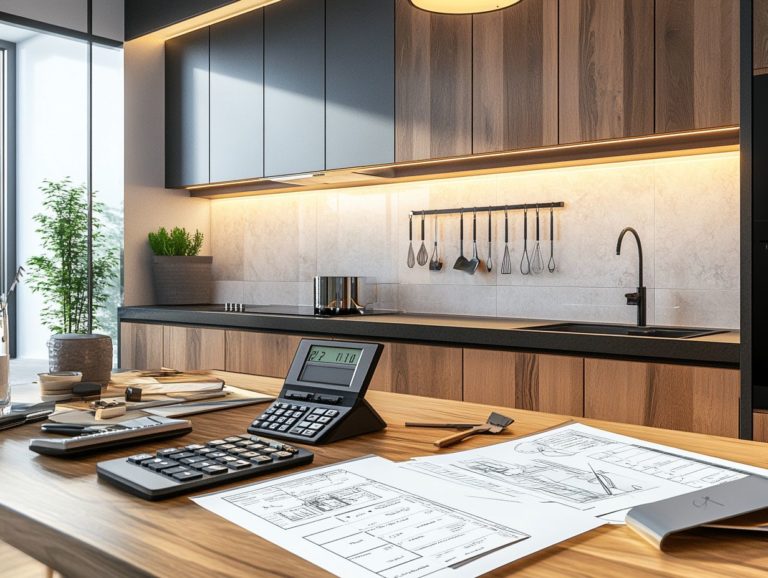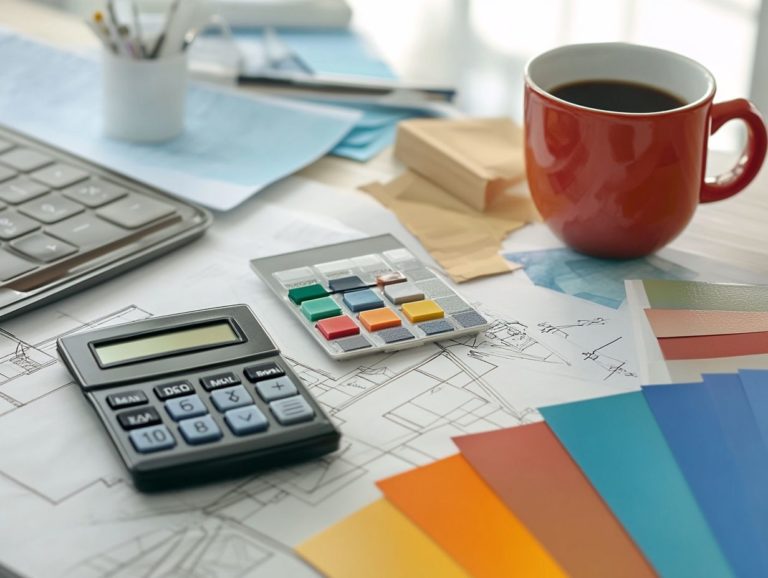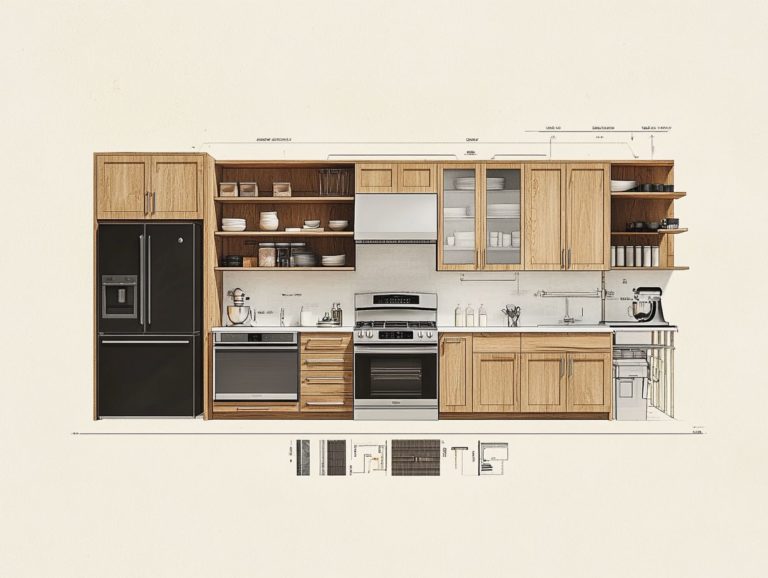How to Manage Unexpected Kitchen Renovation Costs
Renovating your kitchen is an exhilarating adventure, but it can also bring unexpected twists that may impact your budget.
Grasping the factors that influence costs is essential for ensuring a seamless renovation experience. This guide will walk you through creating a contingency budget and mastering effective communication with contractors, equipping you to anticipate and manage any surprises that arise.
We will also explore strategies for handling post-renovation expenses, helping you ensure that your dream kitchen remains a source of joy rather than stress.
Dive into this comprehensive resource to discover the insights you need!
Contents
Key Takeaways:
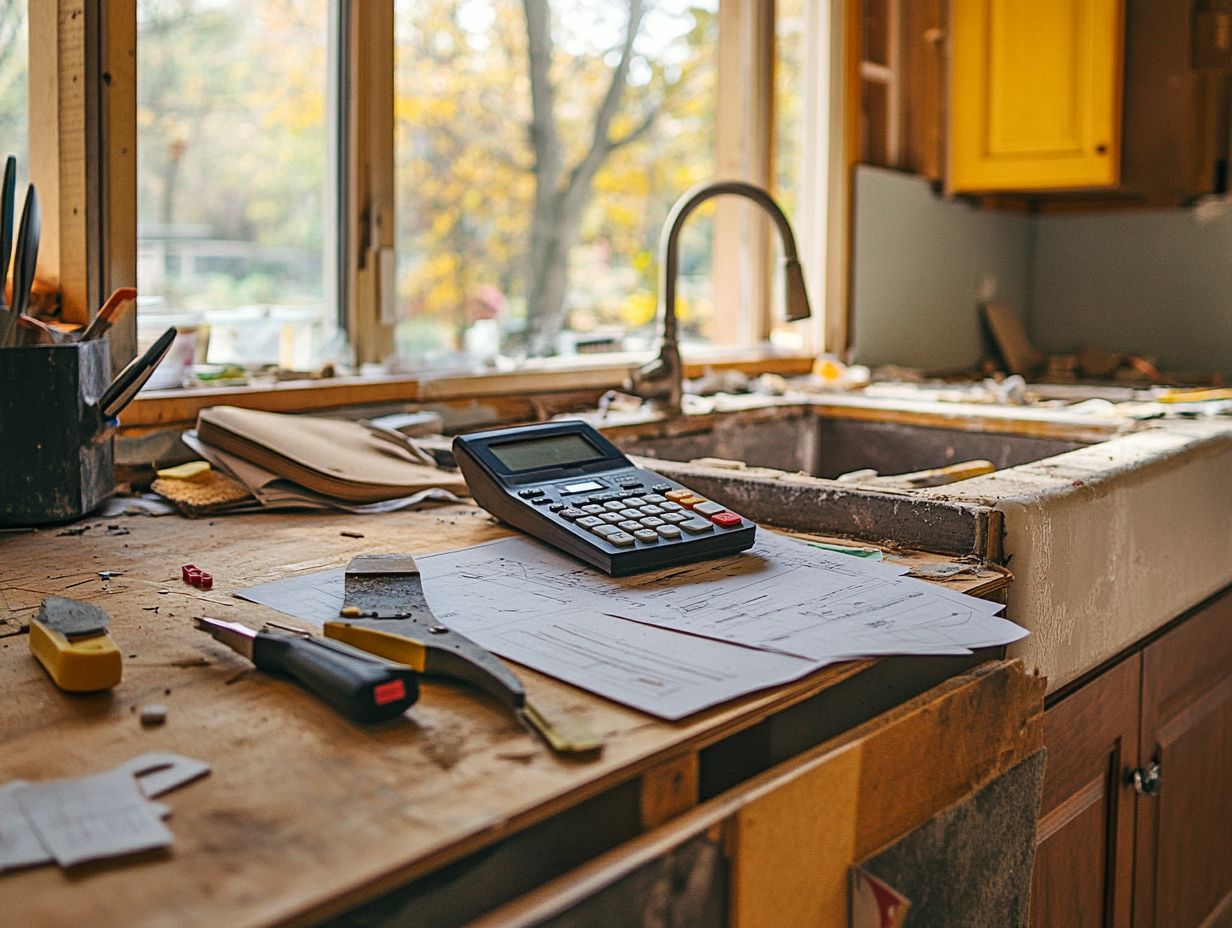
Expect the unexpected by creating a contingency budget for unforeseen kitchen renovation costs. Do thorough research and compare prices to avoid being overcharged by contractors. Communicate effectively with contractors and be willing to compromise on design elements to manage unanticipated costs during the renovation.
Understanding Kitchen Renovation Costs
Understanding kitchen renovation costs is vital as you embark on your remodeling journey. It’s not just about the visible expenses tied to transforming your kitchen space; there’s much more beneath the surface.
Consider factors like hidden costs, the quality of materials, and the expertise of a reliable company that designs and builds, such as DFW Improved. These elements significantly influence your budget management.
By conducting a thorough evaluation of the project scope, you can uncover potential remodeling expenses, ensuring you’re well-prepared for your kitchen renovation and can achieve your goals without any financial surprises.
Factors that Influence Cost
Several key factors significantly influence the overall cost of your kitchen renovation, including structural changes, updates to electrical systems and plumbing, labor costs, and the choice of quality cabinetry.
Each of these elements plays a crucial role in shaping the financial landscape of your remodeling project. For instance, if you decide to alter the kitchen layout, you may face extensive structural modifications, which can drive up both labor and material expenses.
Upgrading electrical and plumbing systems is essential for safety and functionality, yet improper planning can lead to swiftly escalating costs.
It’s imperative to evaluate your kitchen layout thoroughly. A well-considered design can enhance space efficiency and potentially reduce expenses. By conducting a meticulous project assessment, you can discover cost-effective solutions that align with your vision while ensuring your kitchen meets modern standards.
Anticipating and Preparing for Unexpected Costs
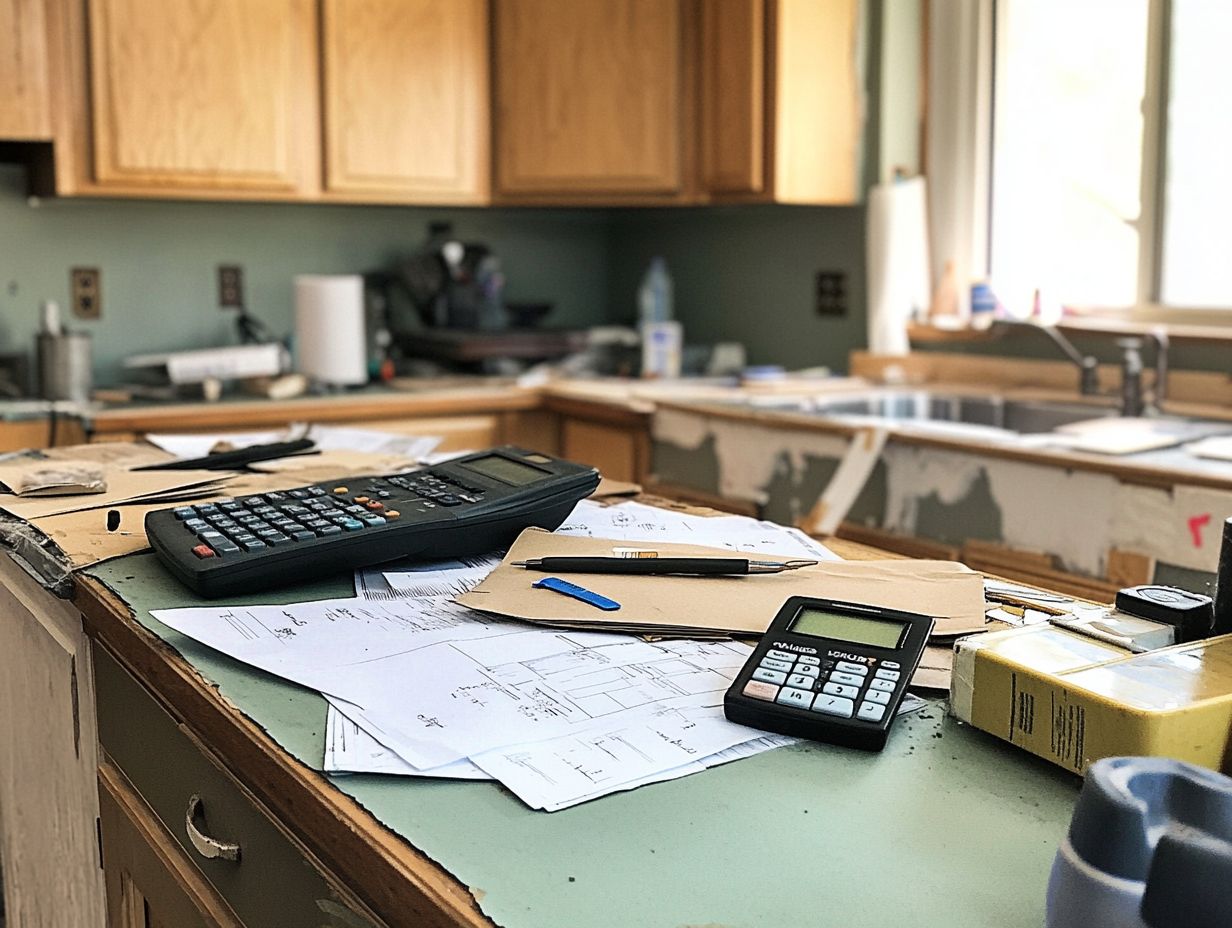
Anticipating and preparing for unexpected costs is essential when managing a kitchen renovation. These unforeseen expenses can easily derail even the most meticulously planned budgets and timelines.
Homeowners must create a strong contingency budget to avoid financial pitfalls! Establishing a budget that factors in potential overruns ensures you have the necessary financing options at the ready.
Moreover, familiarizing yourself with safety codes and regulations can help you sidestep costly changes later on.
Creating a Contingency Budget
Creating a contingency budget is crucial for managing your kitchen renovation effectively. It allows you to set aside funds for unexpected remodeling expenses that might arise along the way.
This proactive strategy not only softens the financial blow of unforeseen circumstances but also grants you peace of mind throughout the renovation journey.
Experts suggest allocating around 10-20% of your total project costs to this contingency budget, ensuring you have enough resources for any emergencies that may arise.
A project manager is key in overseeing this budget while ensuring seamless communication among contractors. Their role is essential in quickly addressing any unexpected issues or changes in scope, helping to minimize delays and keeping your project on track.
By maintaining open lines of communication, the project manager ensures that everyone involved is aware of budget constraints and can work together to find solutions if complications arise.
Start planning your kitchen renovation today to turn your dream into reality!
Researching and Comparing Prices
Researching and comparing prices is an essential step in your kitchen remodeling journey. This process allows you to uncover cost-effective solutions and quality materials that perfectly align with your renovation goals.
This pivotal phase demands a strategic approach. Every dollar spent should contribute to crafting a beautifully designed space.
By exploring various online platforms, showrooms, and retailers, you can access a wide array of options and insights on kitchen appliances and materials. Engaging with multiple remodeling contractors is also wise. Gathering diverse quotes provides a glimpse into competitive pricing, enabling you to make informed decisions.
Discussing project details with different professionals helps you manage costs effectively. It also reveals potential alternatives that may fit your budget better—without compromising on quality.
Managing Unexpected Costs During the Renovation
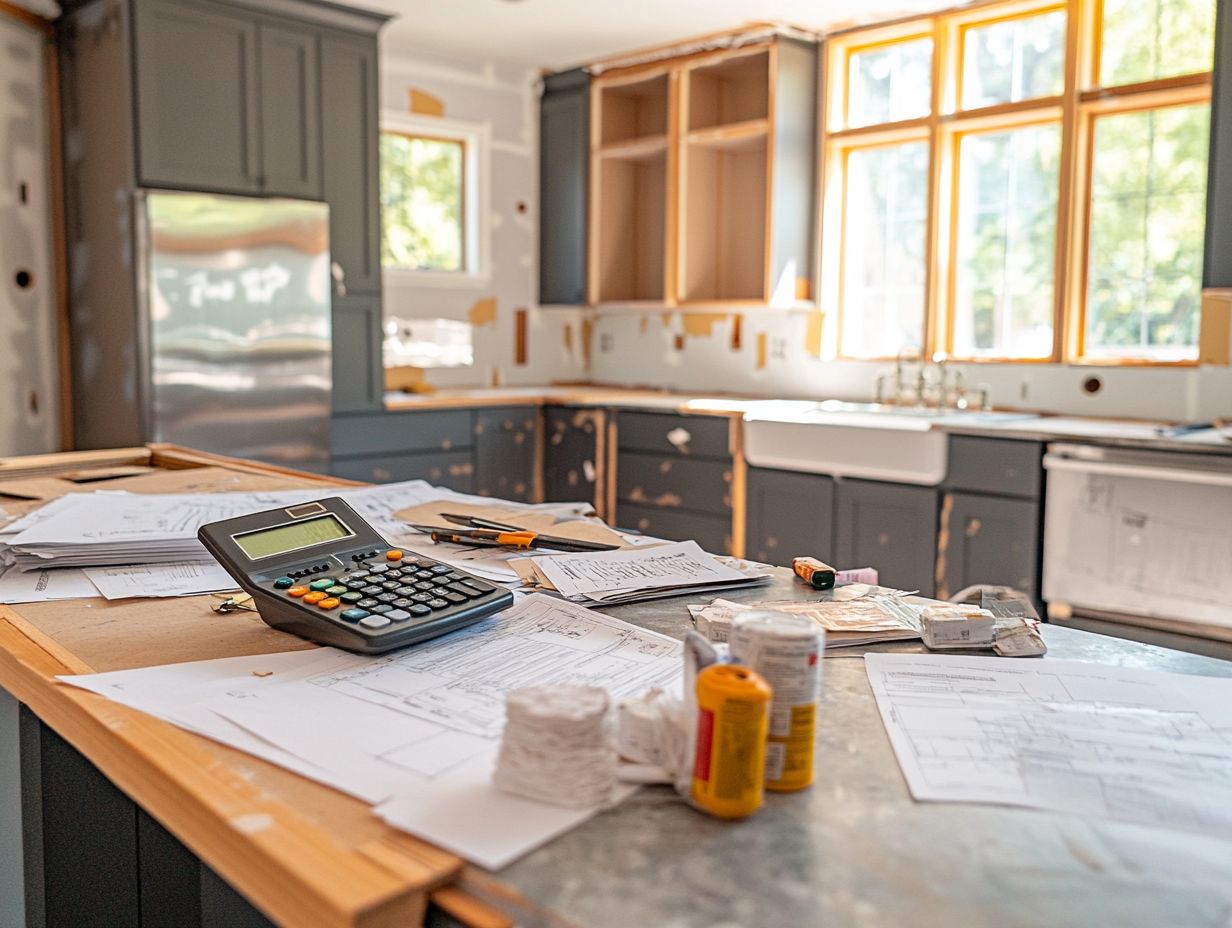
Managing unexpected costs during a kitchen renovation demands exceptional communication with your contractors and project managers. They hold the key to prioritizing and negotiating design elements that allow you to remain within budget.
Should unforeseen expenses arise, you might need to adjust your plans. Thinking about temporary kitchen setups ensures that the renovation continues smoothly without major disruptions.
Effective Communication with Contractors
Effective communication with your contractors is essential for navigating unexpected costs that can arise during a kitchen renovation. It builds trust and teamwork between you and your project manager.
When you engage in open dialogue about project expectations, budget constraints, and potential challenges, you significantly reduce misunderstandings that can lead to financial surprises. This proactive approach enhances your ability to evaluate the project and enables informed decisions throughout the renovation process.
To keep those lines of communication flowing, consider the following:
- Schedule regular check-ins with your contractors.
- Utilize digital project management tools for real-time updates.
- Encourage a culture of feedback.
Prioritizing clear communication helps create a smoother remodeling experience while effectively managing any costs that may arise.
Prioritizing and Compromising on Design Elements
Prioritizing and compromising on design elements are essential strategies for maintaining kitchen functionality while managing costs effectively throughout your remodeling journey.
Start by assessing your specific needs. Distinguish between must-haves—think durable countertops and efficient storage solutions—and nice-to-haves, like decorative backsplashes or high-end appliances.
Understanding the core elements that truly enhance your daily life can streamline your decision-making process. Investing in quality materials, such as granite or quartz, not only elevates your kitchen’s aesthetic but also ensures longevity. These durable materials are popular for their beauty and resilience.
A well-thought-out kitchen layout can optimize space, making navigation a breeze. By focusing on these key factors, you can create a beautiful kitchen without overspending. This ultimately leads to a cost-effective solution that aligns perfectly with your lifestyle demands.
Dealing with Post-Renovation Costs
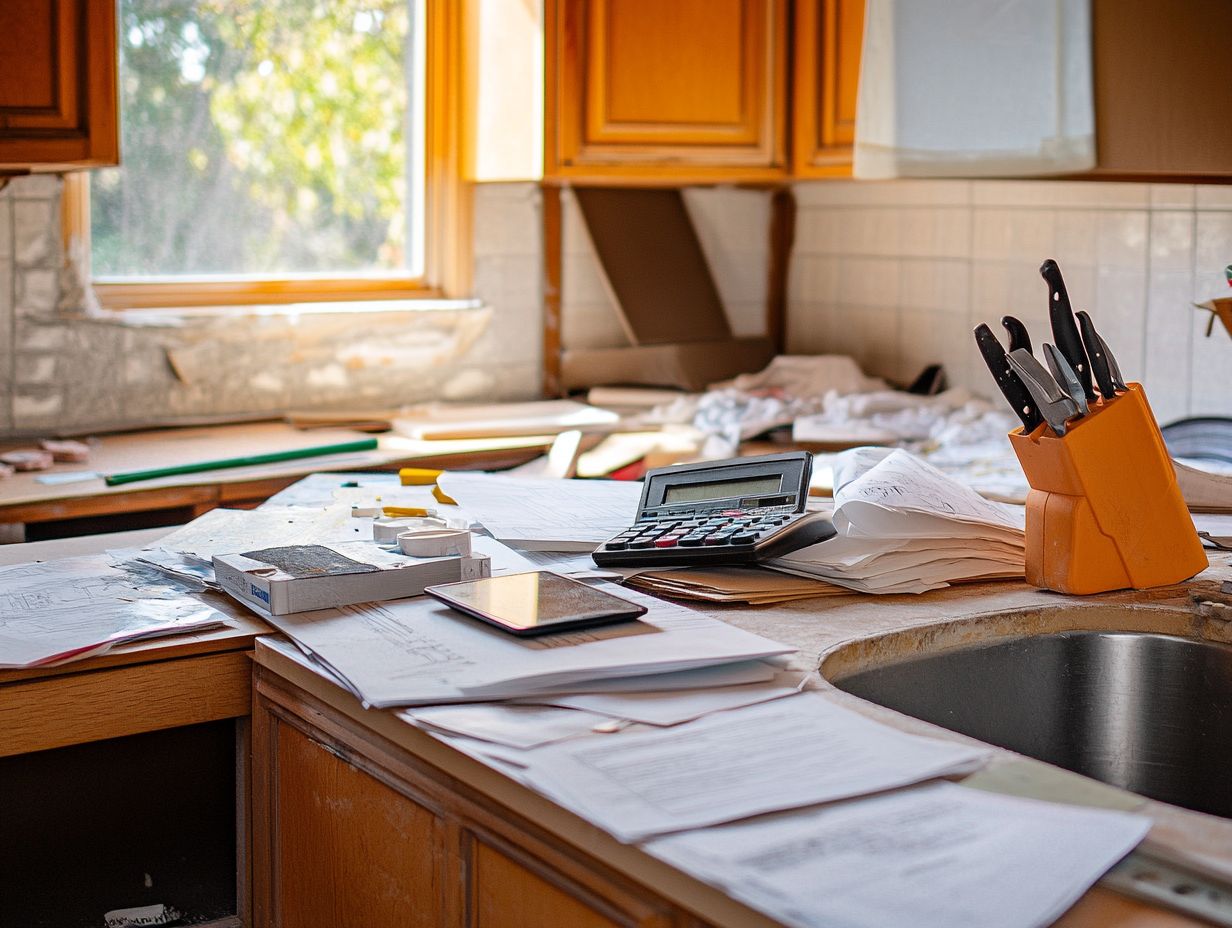
Navigating post-renovation costs is a crucial yet often overlooked aspect of the kitchen remodeling journey. Don’t forget to plan for ongoing expenses associated with maintaining those beautiful new features.
Keeping your stunning kitchen functional and vibrant ensures that your transformation remains both practical and visually appealing.
Maintaining and Repairing New Features
Maintaining and repairing new features in your kitchen can bring additional costs that you should be ready for after a renovation, especially when you’ve invested in quality materials and high-end appliances.
The inevitable wear and tear on your cabinets, countertops, and flooring may cause unexpected repairs, from minor touch-ups to complete replacements. It’s easy to overlook these ongoing expenses while budgeting for your renovation, which could create financial strain later.
To mitigate these risks, choose durable, low-maintenance materials that withstand the test of time. Materials like quartz countertops and high-quality hardwood flooring are great options. Setting aside part of your budget for maintenance will also help ease potential financial burdens.
This way, your beautifully remodeled space can remain functional and aesthetically pleasing, all without sending your budget into a tailspin.
Budgeting for Future Upgrades
Budgeting for future upgrades is a smart move for homeowners. It enables you to plan for anticipated expenses that will transform your kitchen over time.
By setting aside funds specifically for enhancements—like high-quality cabinetry and energy-efficient appliances—you can keep your kitchen stylish and functional for years to come. Energy-efficient appliances save electricity and reduce bills.
Investing in durable materials elevates your kitchen’s look and increases your home’s value.
Take charge of your budget now! Prioritize upgrades based on necessity and potential resale value. Regularly review your expenses and look for sales or financing options to achieve your desired improvements without straining your budget.
Create a savings plan that aligns with your kitchen goals, and you’ll enjoy a more satisfying renovation experience.
